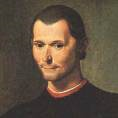
Machiavelli is another writer who proposed a secular solution to the internecine warfare of the Italian city-states. His suggestions came in the form of a cynical handbook for the civil leader called The Prince. Machiavelli’s ideal prince was a two-faced con-artist. The Prince is adept at shifting his moral posture and actions to fit the changing situa-tion. “Might makes right” and “The end justifies the means.”
Who was Machiavelli? Niccollo Machiavelli (1469 –1527) was a diplomat in Florence, the city of his birth, for nearly 20 years. He wrote The Prince (1513) during a nine-year exile (1512-21). Machiavelli was justly critical of the Roman church. He charged that the closer people are to the head of the church, the farther they are from true religion. However, in putting down the church Machiavelli elevated the state. The Prince was raised to a position of dangerous independence from the Bible. His model in The Prince was the ruthless cardinal, Cesare Borgia. Cesare, his brother Juan, and their father, Pope Alexander, were all involved in incest with Lucrezia, the Pope’s beautiful teenage daughter. Cesare rose to power after Juan was found floating in the Tiber. He was the victim of nine garish stab wounds. Cesare was suspect, but his guilt could not be proved. In spite of his brutality, he was elegant and learned. He appeared to prosper for a season, but was murdered in a brawl. “For their feet … make haste to shed blood.” says the proverb, “… they lay wait for their own blood; they lurk privily for their own lives” (Prov. 1:16, 18).
Historical context. Diplomatic missions gave Machiavelli the chance to observe various government practices. He himself knew how to exploit power as a Florentine Bureaucrat. This added to his alienation from the powerful Medici family. The Medici was a banking and ruling family that controlled Florence for about 300 years. They patronized many of the Renaissance artists, including Michelangelo. Their opponents twice expelled them from the city. Two of the Popes of this period were members of the Medici family.
Machiavelli took Caesar Borgia as his contemporary model and imperial Rome as his historic model. From them he derived a set of rules for gaining and holding power. This was a form of historicism. Historicism is the theory that cultural outcomes are governed by laws of history, apart from the control of God.
Summary of Machiavelli’s teaching “…it is much more secure to be feared, than to be loved,” said Machiavelli, “a prudent ruler cannot and should not observe faith when such observance is to his disadvantage. The goal of a strong, central government justifies whatever means it takes to achieve it.
Public morality is based on practical rather than moral grounds. The ruler must assume whatever posture is demanded by the urgency of the moment. He must switch between the façade of kindness, morality, piety at one point and cruelty or terror at the other. The artful practice of deceit and hypocrisy are crucial skills for the prince.
Implications for subsequent history. The 20th Century produced more than its share of Machiavellian rulers. But, U.S. President Bill Clinton was admitted by even his own party to be one of the great masters. Clinton engaged in immorality with a White House intern and lied about it under oath. In spite of this the Democrat Party defended Clinton to a man in true Machiavellian style. They argued the dichotomy between public and private morals. Robert Byrd, the Democrat Senate leader, admitted Clinton’s guilt. But in the same breath declared it was “not an impeachable offense.” Further, it did not rise to “high crimes and misdemeanors.” The Senate failed to convict him even though he was impeached by the House.
This incident was but one example of the Machiavellian posture taken by this President. Clinton found fertile ground in which to cultivate his duplicity. Polling found that the public rated his personal character low, but his job performance high. They were thus willing to wink at his “private” misdeeds. Clinton “confessed” his sin on the personal level, but unlike King David gave no quarter at the legal level. He even resorted to the Machiavellian tactic of stirring up a foreign conflict to detract from his scandals at home.
Biblical analysis. “Thou shalt not bear false witness against thy neighbor.” Public policy based on a direct violation of the 9th Command cannot fail to provoke the judgment of God. God is no respecter of persons. So the Bible requires the civil ruler to live under the same law as the lowest man on the street. Moses commanded Kings of Israel to study the law of God so their “heart be not lifted up above his brethren” (Deut. 17:20). Only in this way would he “prolong his days in his kingdom.” King Ahaz tried to deal fast and loose with the 8th Command in the matter of Naboth’s vineyard. But God brought judgment swiftly upon him (I Kings 21).
The prince who takes Machiavelli’s advice may seem to prosper short-term. In the long run he will fall into the pit that he has dug (Prov. 26:27). Absalom is a good example of a prince who stole the hearts of the people by deceit and grand promises. But he was then swallowed up by the revolt that he kindled.
Corrective or prescriptive actions. Only people with larceny in their hearts can be fooled by the specious promises of a political demagogue. Voters must decide not to sell their vote for promise of gain. This kind of profit can only come at the expense of their neighbors. Rulers and would-be rulers must resist the pressure to make such promises